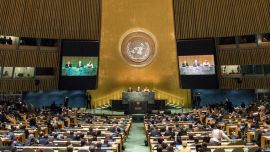President Javier Milei says his government is seeking to raise US$15 billion in capital to speed Argentina’s exit from strict currency controls.
The money could come from various sources, including the International Monetary Fund, other multilateral bodies and private investors, said the La Libertad Avanza leader in a radio interview.
"We are working on that," Milei responded during an interview with Radio Mitre. He explained that the capital could come "from a negotiation that includes the IMF, other countries, and foreign mutual funds.”
The expectation is that "by the middle of the year, we could open the cepo," said Milei, referring to Argentina’s complicated web of foreign currency controls that have been in place since 2019 and limit access to dollars.
Argentina’s historically high inflation, which is currently running at more than 260 percent per annum, means that many citizens use the US currency as a safe haven for savings.
"If they gave me 15 billion [dollars], we would open it now," he said.
The plan, which had been trailed by the president on multiple occasions, would mean increasing the amount of money Argentina owes to the IMF. The nation currently has a credit programme with the multilateral lender worth some US$44 billion.
“The Economy Ministry is negotiating a new agreement with the IMF. If the conditions are satisfactory, we can move forward,” explained Milei, who said that the removal of currency controls should take place before the middle of the year.
“What we have done in our administration puts us in an unbeatable situation because we lowered the [fiscal] deficit by 11 points, out of which five are from the Treasury and six from the Central Bank,” said the president.
The president confirmed that the target is around US$15 billion.
"The quicker we get it, the quicker we lift the cepo,” said Milei.
Despite the promises, Milei acknowledged challenges lie ahead. The president conceded in the interview that Argentines are “going through the toughest month” of his young government to date and that the situation would continue into “the first days of April.”
Nevertheless, he argued, there is strong backing on the streets for his plan. “It’s clear for people that they’re going through a very tough time, but they believe there’s a way out,” he insisted.
"Argentines are putting their shoulders to the wheel, knowing that we can get out of this," he added.
Asked about growing protests against his government on the streets, Milei asked his compatriots for "trust and patience."
S&P withdraws ‘selective default’ rating for Argentina’s debt in pesos
Standard & Poor's has upgraded Argentina's peso debt rating from "selective default" to CCC/C, after it finalised a local currency debt swap that could reach the equivalent of US$55.3 billion.
"The government announced that creditors agreed to swap 77 percent" of the total amount proposed, bringing the amount swapped to the equivalent of US$42.6 billion.
The participation of the private sector in the operation was considered "low" by the ratings agency, since "they exchanged just over 17 percent of their holdings", it said in a statement.
It is, S&P notes, Argentina's sixth such procedure since August 2022.
S&P considers a debt-for-new-bonds swap that takes place in a situation of financial uncertainty "tantamount to a default.
It therefore downgraded its rating for Argentina's local currency sovereign debt to 'SD/SD' from 'CCC-/C' on Wednesday.
"SD" stands for "selective default.”
"Once the debt swap is completed, we will likely upgrade our long-term local currency rating to 'CCC'," the rating agency added at the time, which it did on Friday, deeming the situation "rectified.”
The agency also raised its long-term foreign currency debt rating to CCC from CCC-.
– TIMES/AFP/PERFIL



















Comments